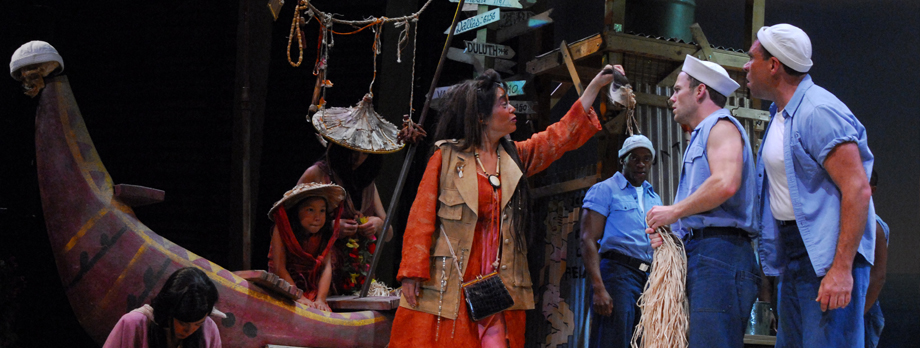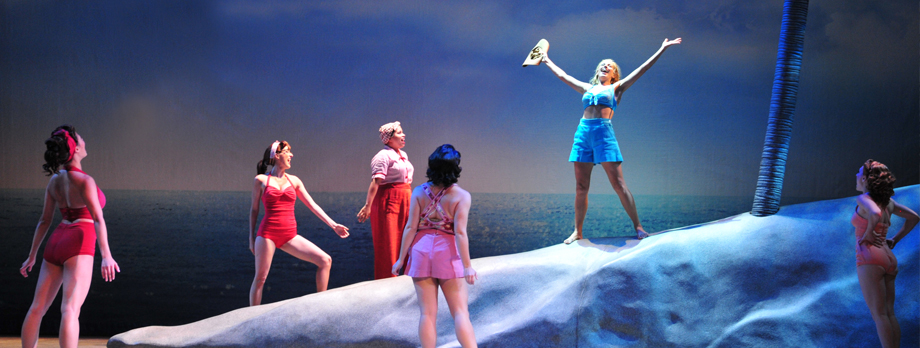ABOUT
The American musical began as purely light-hearted and escapist entertainment that was transformed by Richard Rodgers and Oscar Hammerstein’s groundbreaking works. Their musicals often told believable stories about plausible (often real-life) characters, with songs that enhanced the narrative and a message that was sometimes political and nearly always inspirational. Oscar Hammerstein II was committed to use his creative talents to raise the social consciousness of audiences all over the world. Together with Richard Rodgers, who wrote a seemingly endless flow of wonderfully singable, danceable melodies, they transformed the American musical comedy into an art form of stature, in which plot, music and dancing were closely integrated and frequently employed to explore serious, even tragic, themes.
In South Pacific, with its controversial stance on prejudice, Rodgers and Hammerstein took a bold stand on the issue of civil rights. The musical explores the theme of racial prejudice, with lead character Nellie Furbush struggling to accept Emile de Becque’s (her French expatriate love interest) mixed-race children. Another American serviceman, Lieutenant Cable, also struggles with the prejudice that he would face if he were to marry an Asian woman. These issues expressed in the song “You’ve Got To Be Carefully Taught,” were criticized as too controversial for the musical stage and called indecent and pro-communist by some critics. Rodgers and Hammerstein defended their work strongly. James Michener recalled, "The authors replied stubbornly that this number represented why they had wanted to do this play, and that even if it meant the failure of the production, it was going to stay in.”
American author, James Michener wrote the original novel, “Tales of the South Pacific,” a series of short stories based on his personal experiences when stationed in the South Pacific during World War II. When Michener returned home, he published the book, which went on to great success and began his career as one of America’s leading authors. “Tales of the South Pacific” won Michener the 1948 Pulitzer Prize for Literature.
South Pacific was conceived by the director Joshua Logan. He was working on the play Mr. Rogers, which is set on a Navy ship in the South Pacific during WWII. To get more insight on the time period he read “Tales of the South Pacific.” Logan decided to buy the rights to the book and adapt one of the stories “Fo’ Doll,” for the stage. This was the story of the doomed romance between an American officer and a young Tonkinese woman that eventually inspired the story of Lieutenant Joe Cable and Liat in South Pacific. He brought the idea to Oscar Hammerstein, who eventually used elements of all 18 stories from the Michener collection as inspiration for the musical. Joshua Logan, who was the original director on both the stage musical and the later film, was brought on by Hammerstein to help with the characterization of the military personnel and to make sure the military details in his book were correct, drawing from his experiences in WWII. Logan had expected to work on the project for a day, however, he ended up collaborating with Hammerstein on the entire script – something that took them ten days to complete! Hammerstein wrote all the lyrics himself and Richard Rodgers collaborated by writing the classic score.
South Pacific opened on Broadway on April 7, 1949 and was an immediate sensation. The reviews were raves, the show was a smash hit and it ran for 1,925 performances, finally closing in 1954. The original Broadway production featured Mary Martin as Ensign Nellie Forbush and opera star Ezio Pinza, as Emile de Becque. It won ten Tony Awards and many of its songs went on to have a life of their own outside of the musical, including "Some Enchanted Evening," "I'm Gonna Wash That Man Right Outta My Hair," "Happy Talk," "Bali Ha'i," "Younger Than Springtime" and "I'm in Love with a Wonderful Guy." In 1950 in was awarded the Pulitzer Prize for Drama. It inspired a 1958 film adaptation and has enjoyed numerous successful revivals, including a Broadway revival in 2008, and West End revivals in 1988 and 2001. The 2008 Lincoln Center Theater revival, on which the Ogunquit production is based, went on to win 7 Tony Awards. South Pacific is still considered by audiences and critics alike to be among the greatest musicals of the twentieth century.


